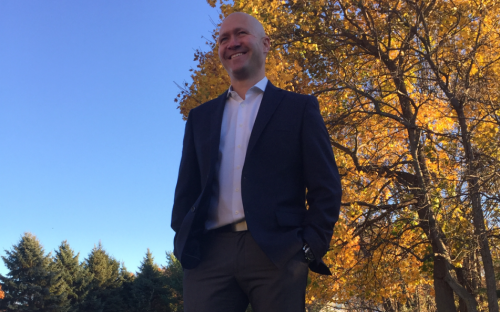For over a decade, Bo served in the Norwegian Army; first as an officer, and then charged with the procurement of military equipment. He left the army, switched to the supply side and joined the Kongsberg Group’s defense and aerospace division as an engineer.
Determined to bolster his business knowledge and gain international exposure alongside a full-time job, he decided to pursue an EMBA.
At SKEMA, he was rotated across four different international campuses in the US, China, France, and his native Norway, building up an international network of high-level professors and peers. After several months, he’d landed a promotion, a pay rise, and a new job abroad.
Bo spoke to BusinessBecause from New Jersey, where he’s site manager of Kongsberg’s US office for weapon control systems. He relocated to the US with his wife and two kids. He owes it all to his EMBA.
How did the SKEMA EMBA help you secure a new role at Kongsberg in the US?
I would never have landed the role if it wasn’t for the EMBA. The requirements for the position were quite broad. And the employees are all highly skilled within different fields of engineering, project management and contract management.
The EMBA gave me a lot of new knowledge about the interactions between the different departments in big companies, and in general how to run a business. Most important, was probably the cultural understanding and learning about how to do business in the US.
Coming from a small country like Norway, getting international experience and the opportunity to experience your home country from the outside, is really valuable.
Why did you decide to pursue an EMBA at SKEMA Business School?
I wanted to broaden my business knowledge and increase my future opportunities.
I was an engineer and I wanted to get some more knowledge on economics and about how to run a business. Plus, more and more jobs now require a master’s degree.
The full-time MBA was never an option for me. I needed to stay in work to have an income. I found the SKEMA EMBA’s syllabus, and its international approach, very interesting.
How did your experience in the Norwegian Army prepare you for a career in business?
The leadership training you receive in the army, the interpersonal skills you pick up, and the experience working with other people, is very useful for being a leader in business.
In my last few years, I was working in procurement as a project manager, procuring military vehicles and systems for the army. Now, I’m in the defense industry providing the same kind of equipment that I used to be a customer for.
What stands out from your EMBA experience at SKEMA?
The professors were excellent and they had real-life experience of the topics they taught. All of the students had a high level of experience in lots of different disciplines.
I learned a lot. I’m in a much better position, in terms of understanding business and all the interactions within companies, having done the EMBA.
If I could pick one specific experience, it would be the two weeks in Texas at the beginning of the program. This was a good teambuilding experience as the group stayed quite close together for two weeks in a different time-zone, far away from where most of us called home.
What would you say to anyone considering an EMBA?
Studying for an EMBA in addition to working full time was hard. But looking back at both the increased knowledge I gained, and all the great people I got to know, I’m really glad I took the leap. I would recommend SKEMA to anyone considering an EMBA.
RECAPTHA :
2f
73
e6
f1








